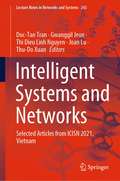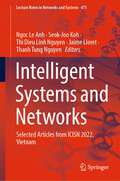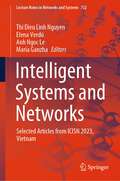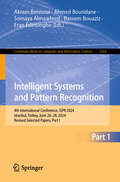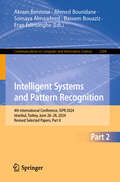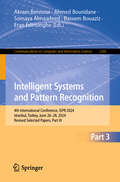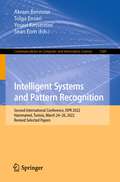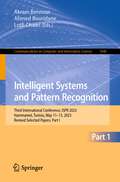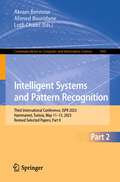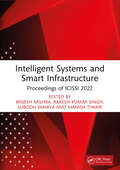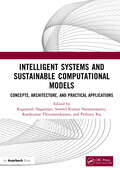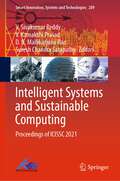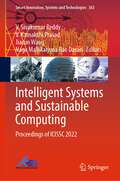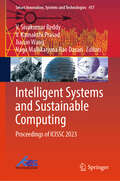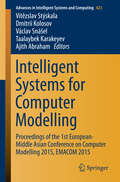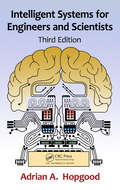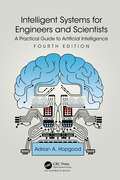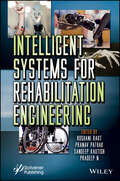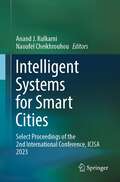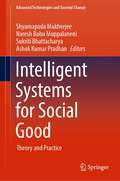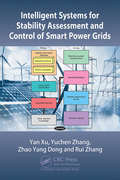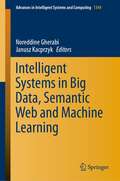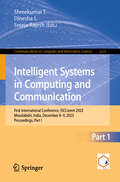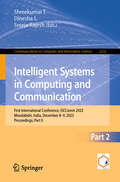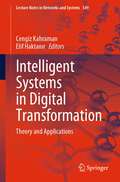- Table View
- List View
Intelligent Systems and Networks: Selected Articles from ICISN 2021, Vietnam (Lecture Notes in Networks and Systems #243)
by Duc-Tan Tran Gwanggil Jeon Thi Dieu Linh Nguyen Joan Lu Thu-Do XuanThis book presents Proceedings of the International Conference on Intelligent Systems and Networks (ICISN 2021), held at Hanoi in Vietnam. It includes peer-reviewed high-quality articles on intelligent system and networks. It brings together professionals and researchers in the area and presents a platform for exchange of ideas and to foster future collaboration. The topics covered in this book include—foundations of computer science; computational intelligence language and speech processing; software engineering software development methods; wireless communications signal processing for communications; electronics track IoT and sensor systems embedded systems; etc.
Intelligent Systems and Networks: Selected Articles from ICISN 2022, Vietnam (Lecture Notes in Networks and Systems #471)
by Jaime Lloret Thi Dieu Linh Nguyen Ngoc Le Anh Seok-Joo Koh Thanh Tung NguyenThis book presents Proceedings of the International Conference on Intelligent Systems and Networks (ICISN 2022), held at Hanoi in Vietnam. It includes peer reviewed high quality articles on Intelligent System and Networks. It brings together professionals and researchers in the area and presents a platform for exchange of ideas and to foster future collaboration. The topics covered in this book include- Foundations of Computer Science; Computational Intelligence Language and speech processing; Software Engineering Software development methods; Wireless Communications Signal Processing for Communications; Electronics track IoT and Sensor Systems Embedded Systems; etc.
Intelligent Systems and Networks: Selected Articles from ICISN 2023, Vietnam (Lecture Notes in Networks and Systems #752)
by Maria Ganzha Thi Dieu Linh Nguyen Elena Verdú Anh Ngoc LeThis book presents Proceedings of the International Conference on Intelligent Systems and Networks (ICISN 2023), held at Hanoi in Vietnam. It includes peer reviewed high impact research manuscripts, that highlight the work based on Intelligent System and Networks. The book presents ongoing research outcomes, results and cutting edge works which are of importance to professionals and academics/researchers. It covers topics such as Computational Intelligence in Language and Speech Processing; Software development methods; Wireless Communications and Signal Processing; IoT and Sensor Embedded Systems ; etc.
Intelligent Systems and Pattern Recognition: 4th International Conference, ISPR 2024, Istanbul, Turkey, June 26-28, 2024, Revised Selected Papers, Part I (Communications in Computer and Information Science #2303)
by Ahmed Bouridane Akram Bennour Somaya Almaadeed Bassem Bouaziz Eran EdirisingheThis Three-volume set CCIS 2303-2305 constitutes the proceedings of the 4th International Conference on Intelligent Systems and Pattern Recognition, ISPR 2024, held in Istanbul, Turkey, in June 26–28, 2024. The 77 full papers presented were thoroughly reviewed and selected from the 210 submissions. The conference provided an interdisciplinary forum for the exchange of innovative advancements in the fields of artificial intelligence and pattern recognition.
Intelligent Systems and Pattern Recognition: 4th International Conference, ISPR 2024, Istanbul, Turkey, June 26-28, 2024, Revised Selected Papers, Part II (Communications in Computer and Information Science #2304)
by Ahmed Bouridane Akram Bennour Somaya Almaadeed Bassem Bouaziz Eran EdirisingheThis Three-volume set CCIS 2303-2305 constitutes the proceedings of the 4th International Conference on Intelligent Systems and Pattern Recognition, ISPR 2024, held in Istanbul, Turkey, in June 26–28, 2024. The 77 full papers presented were thoroughly reviewed and selected from the 210 submissions. The conference provided an interdisciplinary forum for the exchange of innovative advancements in the fields of artificial intelligence and pattern recognition.
Intelligent Systems and Pattern Recognition: 4th International Conference, ISPR 2024, Istanbul, Turkey, June 26-28, 2024, Revised Selected Papers, Part III (Communications in Computer and Information Science #2305)
by Ahmed Bouridane Akram Bennour Somaya Almaadeed Bassem Bouaziz Eran EdirisingheThis Three-volume set CCIS 2303-2305 constitutes the proceedings of the 4th International Conference on Intelligent Systems and Pattern Recognition, ISPR 2024, held in Istanbul, Turkey, in June 26–28, 2024. The 77 full papers presented were thoroughly reviewed and selected from the 210 submissions. The conference provided an interdisciplinary forum for the exchange of innovative advancements in the fields of artificial intelligence and pattern recognition.
Intelligent Systems and Pattern Recognition: Second International Conference, ISPR 2022, Hammamet, Tunisia, March 24–26, 2022, Revised Selected Papers (Communications in Computer and Information Science #1589)
by Yousri Kessentini Akram Bennour Tolga Ensari Sean EomThis volume constitutes selected papers presented during the Second International Conference on Intelligent Systems and Pattern Recognition, ISPR 2022, held in Hammamet, Tunisia, in March 2022. Due to the COVID-19 pandemic the conference was held online. The 22 full papers and 10 short papers presented were thoroughly reviewed and selected from the 91 submissions. The papers are organized in the following topical sections: computer vision; data mining; pattern recognition; machine and deep learning.
Intelligent Systems and Pattern Recognition: Third International Conference, ISPR 2023, Hammamet, Tunisia, May 11–13, 2023, Revised Selected Papers, Part I (Communications in Computer and Information Science #1940)
by Ahmed Bouridane Lotfi Chaari Akram BennourThis volume constitutes selected papers presented during the Third International Conference on Intelligent Systems and Pattern Recognition, ISPR 2023, held in Hammamet, Tunisia, in May 2023. The 44 full papers presented were thoroughly reviewed and selected from the 129 submissions. The papers are organized in the following topical sections: computer vision; data mining; pattern recognition; machine and deep learning.
Intelligent Systems and Pattern Recognition: Third International Conference, ISPR 2023, Hammamet, Tunisia, May 11–13, 2023, Revised Selected Papers, Part II (Communications in Computer and Information Science #1941)
by Ahmed Bouridane Lotfi Chaari Akram BennourThis volume constitutes selected papers presented during the Third International Conference on Intelligent Systems and Pattern Recognition, ISPR 2023, held in Hammamet, Tunisia, in May 2023. The 44 full papers presented were thoroughly reviewed and selected from the 129 submissions. The papers are organized in the following topical sections: computer vision; data mining; pattern recognition; machine and deep learning.
Intelligent Systems and Smart Infrastructure: Proceedings of ICISSI 2022
by Manish Tiwari Rakesh Kumar Singh Brijesh Mishra Subodh WairyaThis book covers the proceedings of ICISSI 2022 (International Conference on Intelligent Systems and Smart Infrastructure) held at Prayagraj, Uttar Pradesh during April 21–22, 2022. The conference was jointly organised by Shambhunath Institute of Engineering and Technology, Prayagraj UP India, Institute of Engineering and Technology (IET) Lucknow, U.P India, and Manipal University Jaipur, Rajasthan India with an aim to provide a platform for researchers, scientists, technocrats, academicians and engineers to exchange their innovative ideas and new challenges being faced in the field of emerging technologies. The papers presented in the conference have been compiled in form of chapters to focus on the core technological developments in the emerging fields like machine learning, intelligence systems, smart infrastructure, advanced power technology etc.
Intelligent Systems and Sustainable Computational Models: Concepts, Architecture, and Practical Applications
by Pethuru Raj Rajganesh Nagarajan Ramkumar Thirunavukarasu Senthil Kumar NarayanasamyThe fields of intelligent systems and sustainability have been gaining momentum in the research community. They have drawn interest in such research fields as computer science, information technology, electrical engineering, and other associated engineering disciples. The promise of intelligent systems applied to sustainability is becoming a reality due to the recent advancements in the Internet of Things (IoT), Artificial Intelligence, Big Data, blockchain, deep learning, and machine learning. The emergence of intelligent systems has given rise to a wide range of techniques and algorithms using an ensemble approach to implement novel solutions for complex problems associated with sustainability.Intelligent Systems and Sustainable Computational Models: Concepts, Architecture, and Practical Applications explores this ensemble approach towards building a sustainable future. It explores novel solutions for such pressing problems as smart healthcare ecosystems, energy efficient distributed computing, affordable renewable resources, mitigating financial risks, monitoring environmental degradation, and balancing climate conditions. The book helps researchers to apply intelligent systems to computational sustainability models to propose efficient methods, techniques, and tools. The book covers such areas as: Intelligent and adaptive computing for sustainable energy, water, and transportation networks Blockchain for decentralized systems for sustainable applications, systems, and infrastructure IoT for sustainable critical infrastructure Explainable AI (XAI) and decision-making models for computational sustainability Sustainable development using edge computing, fog computing and cloud computing Cognitive intelligent systems for e-learning Artificial Intelligence and machine learning for large scale data Green computing and cyber physical systems Real-time applications in healthcare, agriculture, smart cities, and smart governance.By examining how intelligent systems can build a sustainable society, the book presents systems solutions that can benefit researchers and professionals in such fields as information technology, health, energy, agricultural, manufacturing, and environmental protection.
Intelligent Systems and Sustainable Computing: Proceedings of ICISSC 2021 (Smart Innovation, Systems and Technologies #289)
by Suresh Chandra Satapathy V. Kamakshi Prasad V. Sivakumar Reddy D. N. Mallikarjuna RaoThe book is a collection of best selected research papers presented at the International Conference on Intelligent Systems and Sustainable Computing (ICISSC 2021), held in School of Engineering, Malla Reddy University, Hyderabad, India, during 24–25 September 2021. The book covers recent research in intelligent systems, intelligent business systems, soft computing, swarm intelligence, artificial intelligence and neural networks, data mining & data warehousing, cloud computing, distributed computing, big data analytics, Internet of Things (IoT), machine learning, speech processing, sustainable high-performance systems, VLSI and embedded systems, image and video processing, and signal processing and communication.
Intelligent Systems and Sustainable Computing: Proceedings of ICISSC 2022 (Smart Innovation, Systems and Technologies #363)
by V. Kamakshi Prasad Jiacun Wang V. Sivakumar Reddy Naga Mallikarjuna Rao DasariThis book is a collection of best selected research papers presented at Second International Conference on Intelligent Systems and Sustainable Computing (ICISSC 2022), held in School of Engineering, Malla Reddy University, Hyderabad, India, during December 16–17, 2022. The book covers recent research in intelligent systems, intelligent business systems, soft computing, swarm intelligence, artificial intelligence and neural networks, data mining and data warehousing, cloud computing, distributed computing, big data analytics, Internet of things (IoT), machine learning, speech processing, sustainable high-performance systems, VLSI and embedded systems, image and video processing and signal processing and communication.
Intelligent Systems and Sustainable Computing: Proceedings of ICISSC 2023 (Smart Innovation, Systems and Technologies #417)
by V. Kamakshi Prasad Jiacun Wang V. Sivakumar Reddy Naga Mallikarjuna Rao DasariThis book is a collection of best-selected research papers presented at Third International Conference on Intelligent Systems and Sustainable Computing (ICISSC 2023), held in School of Engineering, Malla Reddy University, Hyderabad, India, during December 22–23, 2023. The book covers recent research in intelligent systems, intelligent business systems, soft computing, swarm intelligence, artificial intelligence and neural networks, data mining and data warehousing, cloud computing, distributed computing, big data analytics, Internet of Things (IoT), machine learning, speech processing, sustainable high-performance systems, VLSI and embedded systems, image and video processing, and signal processing and communication. Chapters 7 and 32 in this book is available open access under a CC BY 4.0 license at link.springer.com.
Intelligent Systems for Computer Modelling
by Ajith Abraham Václav Snášel Vítězslav Stýskala Dmitrii Kolosov Taalaybek KarakeyevThis volumeof Advances in Intelligent Systems and Computing contains papers presented atthe 1st European-Middle Asian Conference on Computer Modelling, EMACOM 2015. This international conference was conceived as a brand new scientific andsocial event of mutual collaboration between the VSB - Technical University ofOstrava (Ostrava, Czech Republic) and the Kyrgyz National University namedafter J. Balasagyn (Bishkek, Kyrgyz Republic). The aim of EMACOM 2015 was topresent the latest development in the field of computer-aided modelling as anessential aspect of research and development of innovative systems and theirapplications. The conference showed that together with simulations, variousmodeling techniques, enabled and encouraged by the rapid development ofhigh-performance computing platforms, are crucial for cost-efficient design,verification, and prototyping of solutions in many diverse industrial fieldsspanning the whole range from manufacturing, mining, machinery, and automotiveindustries to infrastructure planning and development, economics, energy, andmodern agriculture and food industry.
Intelligent Systems for Engineers and Scientists
by Adrian A. HopgoodThe third edition of this bestseller examines the principles of artificial intelligence and their application to engineering and science, as well as techniques for developing intelligent systems to solve practical problems. Covering the full spectrum of intelligent systems techniques, it incorporates knowledge-based systems, computational intellige
Intelligent Systems for Engineers and Scientists: A Practical Guide to Artificial Intelligence
by Adrian A. HopgoodThe fourth edition of this bestselling textbook explains the principles of artificial intelligence (AI) and its practical applications. Using clear and concise language, it provides a solid grounding across the full spectrum of AI techniques, so that its readers can implement systems in their own domain of interest. The coverage includes knowledge-based intelligence, computational intelligence (including machine learning), and practical systems that use a combination of techniques. All the key techniques of artificial intelligence are explained—including rule-based systems, Bayesian updating, certainty theory, fuzzy logic (types 1 and 2), agents, objects, frames, symbolic learning, case-based reasoning, genetic algorithms and other optimization techniques, shallow and deep neural networks, hybrids, and the Lisp, Prolog, and Python programming languages. The book also describes a wide range of practical applications in interpretation and diagnosis, design and selection, planning, and control. Fully updated and revised, Intelligent Systems for Engineers and Scientists: A practical guide to artificial intelligence, Fourth Edition features: A new chapter on deep neural networks, reflecting the growth of machine learning as a key technique for AI A new section on the use of Python, which has become the de facto standard programming language for many aspects of AI The rule-based and uncertainty-based examples in the book are compatible with the Flex toolkit by Logic Programming Associates (LPA) and its Flint extension for handling uncertainty and fuzzy logic. Readers of the book can download this commercial software for use free of charge. This resource and many others are available at the author’s website: adrianhopgood.com Whether you are building your own intelligent systems, or you simply want to know more about them, this practical AI textbook provides you with detailed and up-to-date guidance.
Intelligent Systems for Rehabilitation Engineering
by Sandeep Kautish Roshani Raut Pranav Pathak Pradeep NINTELLIGENT SYSTEMS FOR REHABILITATION ENGINEERING Encapsulates different case studies where technology can be used as assistive technology for the physically challenged, visually and hearing impaired. Rehabilitation engineering includes the development of technological solutions and devices to assist individuals with disabilities, while also supporting the recovery of the disabled who have lost their physical and cognitive functions. These systems can be designed and built to meet a wide range of needs that can help individuals with mobility, communication, vision, hearing, and cognition. The growing technological developments in machine learning, deep learning, robotics, virtual intelligence, etc., play an important role in rehabilitation engineering. Intelligent Systems for Rehabilitation Engineering focuses on trending research of intelligent systems in rehabilitation engineering which involves the design and development of innovative technologies and techniques including rehabilitation robotics, visual rehabilitation, physical prosthetics, brain computer interfaces, sensory rehabilitation, motion rehabilitation, etc. This groundbreaking book Provides a comprehensive reference covering different computer assistive techniques for the physically disabled, visually and hearing impaired. Focuses on trending research of intelligent systems in rehabilitation engineering which involves the design and development of innovative technologies and techniques. Provides insights into the role of intelligent systems in rehabilitation engineering. Audience Engineers and device manufacturers working in rehabilitation engineering as well as researchers in computer science, artificial intelligence, electronic engineering, who are working on intelligent systems.
Intelligent Systems for Smart Cities: Select Proceedings of the 2nd International Conference, ICISA 2023
by Anand J. Kulkarni Naoufel CheikhrouhouThis book presents the select proceedings of the 2nd International Conference on Intelligent Systems and Applications 2023. The theme of this conference is ‘Intelligent Systems for Smart Cities'. It covers the topics of intelligent systems in multiple aspects such as healthcare, supply chain and logistics, smart homes and smart structures, banking and finance, a sustainable environment, social media and cyber security, crime prevention, and disaster management. The book will be useful for researchers and professionals interested in the broad field of artificial intelligence and machine learning.
Intelligent Systems for Social Good: Theory and Practice (Advanced Technologies and Societal Change)
by Naresh Babu Muppalaneni Ashok Kumar Pradhan Shyamapada Mukherjee Sukriti BhattacharyaThis book highlights the connections between two technologies: artificial intelligence (AI) and Internet of things (IoT). It presents the application of these two technologies to solve various societal problems related to healthcare, agriculture, green environment, renewable energies, smart cities, etc. Each chapter in this book presents novel solutions to these problems along with the challenges in the application of AI and IoT to solve them. It discusses the adverse attacks on machine Learning models and how to protect sensitive data over the IoT networks. It also includes the security issues in IoT and their possible solutions.
Intelligent Systems for Stability Assessment and Control of Smart Power Grids: Security Analysis, Optimization, and Knowledge Discovery
by Yan Xu Rui Zhang Zhao Yang Dong Yuchen ZhangPower systems are evolving towards the Smart Grid paradigm, featured by large-scale integration of renewable energy resources, e.g. wind and solar power, deeper participation of demand side, and enhanced interaction with electric vehicles. While these emerging elements are inherently stochastic in nature, they are creating a challenge to the system’s stability and its control. In this context, conventional analysis tools are becoming less effective, and necessitate the use alternative tools that are able to deal with the high uncertainty and variability in the smart grid. Smart Grid initiatives have facilitated wide-spread deployment of advanced sensing and communication infrastructure, e.g. phasor measurement units at grid level and smart meters at household level, which collect tremendous amount of data in various time and space scales. How to fully utilize the data and extract useful knowledge from them, is of great importance and value to support the advanced stability assessment and control of the smart grid. The intelligent system strategy has been identified as an effective approach to meet the above needs. This book presents the cutting-edge intelligent system techniques and their applications for stability assessment and control of power systems. The major topics covered in this book are: Intelligent system design and algorithms for on-line stability assessment, which aims to use steady-state operating variables to achieve fast stability assessment for credible contingencies. Intelligent system design and algorithms for preventive stability control, which aims at transparent and interpretable decision-making on preventive control actions to manipulate system operating condition against possible contingencies. Intelligent system design and algorithms for real-time stability prediction, which aims to use synchronized measurements to foresee the stability status under an ongoing disturbance. Intelligent system design and algorithms for emergency stability control, which aims at fast decision-making on stability control actions at emergency stage where instability is propagating. Methodologies and algorithms for improving the robustness of intelligent systems against missing-data issues. This book is a reference and guide for researchers, students, and engineers who seek to study and design intelligent systems to resolve stability assessment and control problems in the smart grid age.
Intelligent Systems in Big Data, Semantic Web and Machine Learning (Advances in Intelligent Systems and Computing #1344)
by Janusz Kacprzyk Noreddine GherabiThis book describes important methodologies, tools and techniques from the fields of artificial intelligence, basically those which are based on relevant conceptual and formal development. The coverage is wide, ranging from machine learning to the use of data on the Semantic Web, with many new topics. The contributions are concerned with machine learning, big data, data processing in medicine, similarity processing in ontologies, semantic image analysis, as well as many applications including the use of machine leaning techniques for cloud security, artificial intelligence techniques for detecting COVID-19, the Internet of things, etc. The book is meant to be a very important and useful source of information for researchers and doctoral students in data analysis, Semantic Web, big data, machine learning, computer engineering and related disciplines, as well as for postgraduate students who want to integrate the doctoral cycle.
Intelligent Systems in Computing and Communication: First International Conference, ISCComm 2023, Moodabidri, India, December 8–9, 2023, Proceedings, Part I (Communications in Computer and Information Science #2231)
by Shreekumar T. Dinesha L. Sreeja RajeshThis book constitutes the refereed proceedings of the First International Conference, Intelligent Systems in Computing and Communication, ISCComm 2023, held in Moodabidri, India, during December 8–9, 2023. The 36 full papers and 17 short papers were carefully reviewed and selected from 245 proceedings. They were categorized under the topical sections as follows: Part I: Artificial Intelligence and Machine Learning Part II: IoT&Blockchain Technology, Communication Technology and Data Processing, Image/Video Analysis and Processing
Intelligent Systems in Computing and Communication: First International Conference, ISCComm 2023, Moodabidri, India, December 8–9, 2023, Proceedings, Part-II (Communications in Computer and Information Science #2232)
by Shreekumar T. Dinesha L. Sreeja RajeshThis book constitutes the refereed proceedings of the First International Conference, Intelligent Systems in Computing and Communication, ISCComm 2023, held in Moodabidri, India, during December 8–9, 2023. The 36 full papers and 17 short papers were carefully reviewed and selected from 245 proceedings. They were categorized under the topical sections as follows: Part I: Artificial Intelligence and Machine Learning Part II: IoT&Blockchain Technology, Communication Technology and Data Processing, Image/Video Analysis and Processing
Intelligent Systems in Digital Transformation: Theory and Applications (Lecture Notes in Networks and Systems #549)
by Cengiz Kahraman Elif HaktanırThis book states that intelligent digital transformation is the process of using artificial intelligence techniques in digital technologies such as machine learning, natural language processing, automation and robotics to transform existing non-digital business processes and services to meet with the evolving market and customer expectations. This book including 26 chapters, each written by their experts, focuses on revealing the reflection of digital transformation in our business and social life under emerging conditions through intelligent systems. Intelligent digital transformation examples from almost all sectors including health, education, manufacturing, tourism, insurance, smart cities, banking, energy and transportation are introduced by theory and applications. The intended readers are managers responsible for digital transformation, intelligent systems researchers, lecturers, and MSc and PhD students studying digital transformation.
